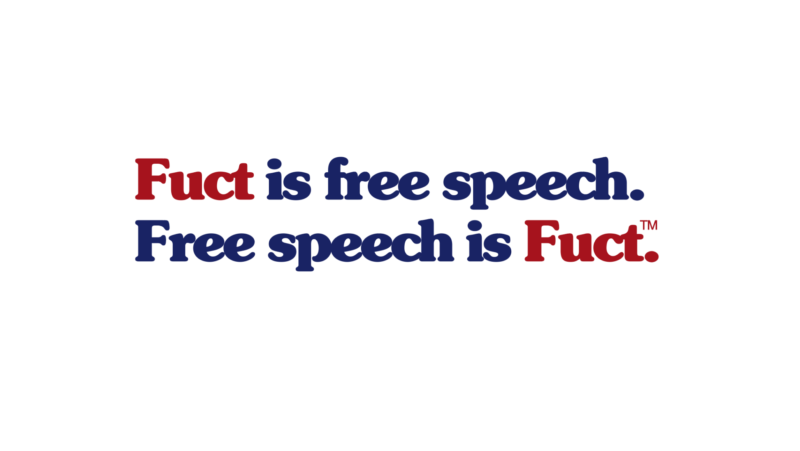
Fuct
Federal law prohibits the registration of trademarks that are “immoral or scandalous.” At least it did until today, when the Supreme Court held that the requirement violated the First Amendment.
The case focused on artist and entrepreneur Erik Brunetti, who sells clothing under the trademark FUCT. Brunetti claims the mark is “pronounced as four letters, one after the other: F-U-C-T.” But a lot of people have interpreted it as (in the words of the government’s lawyer in the case) “the profane past participle form of a well-known word of profanity.”
Beyond that, the US Patent and Trademark Office looked at the products being sold under the FUCT mark. “Brunetti’s website and products contained imagery, near the mark, of ‘extreme nihilism’ and ‘antisocial’ behavior,” the Supreme court noted in its Monday opinion. The trademark office concluded that the FUCT mark “communicated misogyny, depravity, and violence,” and rejected the registration.
But that’s exactly the kind of analysis a government agency isn’t allowed to do under the First Amendment, a six-justice majority ruled.
Bong hits 4 Jesus
“If a trademark registration bar is viewpoint-based, it is unconstitutional,” the court held.
The justices noted that the trademark office has a track record of making viewpoint-based judgments about trademark registrations under the immorality clause.
A registration for “YOU CAN’T SPELL HEALTHCARE WITHOUT THC” got rejected as immoral and scandalous, while a registration for “SAY NO TO DRUGS—REALITY IS THE BEST TRIP IN LIFE” was accepted. Beverages called “MARIJUANA COLA” and “KO KANE” were also refused trademark registrations.”JESUS DIED FOR YOU” could be registered, but “BONG HITS 4 JESUS” couldn’t.
That’s a problem, the court concluded, because “a law disfavoring ‘ideas that offend’ discriminates based on viewpoint, in violation of the First Amendment.”
The case wasn’t about Brunetti’s right to sell products with the “FUCT” label on them. It’s perfectly legal to sell products with an unregistered mark, and these marks even have limited legal protections. But registration provides much stronger legal powers to prevent others from using the trademark without permission.
The ruling follows a landmark 2017 precedent
The ruling comes two years after another Supreme Court ruling on offensive trademarks. In that case, the high court struck down language prohibiting the registration for trademarks that were disparaging to any individual or group of people.
That case focused on an Asian-American rock band called “The Slants.” The band was attempting to reclaim a derogatory term for Asian people, but the trademark office rejected the trademark for disparaging Asians. The Supreme Court ruled it was unconstitutional for the government to prohibit trademarks that disparage people while allowing trademarks that praise them.
Now the Supreme Court has applied the same reasoning to the rule against immoral and scandalous trademarks. However, the high court left open the possibility that Congress could ban a narrower class of trademarks that are lewd, sexually explicit, or profane. If Congress chose to pass such a law, then trademarks using the F-word might once again be excluded from registration. But if you’ve always wanted to own a registered trademark with a swear word in it, now is your chance.
via Ars Technica
SCOTUS: Ban on “FUCT” trademark registration violates First Amendment